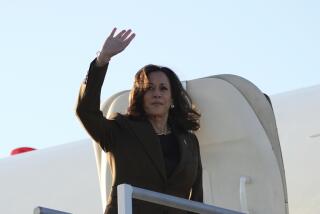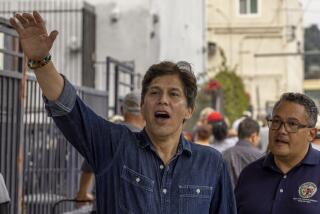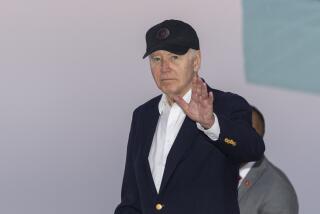Gore in Dark on Temple Event, Ex-Aide Says
- Share via
WASHINGTON — Republican senators on Friday confronted a former top aide to Vice President Al Gore with a trail of documents they said showed that Gore knew a luncheon held at a Buddhist temple in California last year was a fund-raiser.
But David M. Strauss, Gore’s former deputy chief of staff, insisted that Gore was in the dark about the illegal fund-raising surrounding the event and considered it to be nothing more than a community outreach effort for Asian Americans.
“I take full responsibility for the vice president’s knowledge about this event,” Strauss told the Senate Governmental Affairs Committee, which was in its second day of resumed hearings on alleged campaign fund-raising abuses. “He got the significant information from me and from the briefing book.”
In the end, the day’s testimony left Gore’s knowledge of the most controversial event of the 1996 election campaign unresolved and in sharp dispute. He has acknowledged that he knew the event was “finance-related” and an exercise in “donor maintenance” but not a formal fund-raiser.
The briefing materials given to Gore on his way to the Hacienda Heights temple on April 29, 1996, characterized the event as a gathering of Asian American donors sponsored by the Democratic National Committee. There was no explicit mention of fund-raising.
But internal White House documents produced by Senate Republicans showed that Gore staffers repeatedly referred to the event as a “fund-raiser” in the weeks before it took place. And Clinton/Gore campaign records show fund-raising projections, up to $200,000, for events that day during Gore’s trip to Los Angeles.
“I just can’t see how the vice president could not have known [it was a fund-raiser] given the numerous documents,” said Sen. Susan Collins (R-Maine).
Among the records Collins cited was a memo to Gore’s chief scheduler from DNC fund-raiser John Huang, who organized the temple event, calling it a “fund-raising lunch.” Also, Gore’s national security aide, John J. Norris, characterized the gathering as a “fund-raising lunch” in electronic mail.
Even Strauss, who continues to maintain the event was not a fund-raiser, slipped up once during his testimony and used the term. Gore’s counsel, Charles Burson, treading cautiously in a briefing with reporters after Strauss’ testimony, said: “I can’t say the event didn’t turn out to be a fund-raiser.”
Gore’s knowledge of the temple event is important because the brief affair has turned into the most embarrassing fund-raising episode of the star-crossed campaign, one that violated the law on at least two fronts.
It is illegal for a tax-exempt institution like the temple to engage in political activity. Also, the temple violated federal election laws by compensating donors for checks they wrote to the DNC in connection with Gore’s appearance.
Three Buddhist nuns from the temple testified Thursday that $45,000 was collected for the DNC a day before Gore’s appearance, and $55,000 more was raised a day after the speech--at Huang’s urging. Of the $100,000 take, $65,000 was laundered by the temple, investigators say.
Strauss’ testimony kept the focus on Gore at a time when he is also under fire for fund-raising calls he made from his White House office. Atty. Gen. Janet Reno said this week she was considering opening a preliminary inquiry to determine whether an independent counsel should investigate the vice president.
At a press briefing Friday, Reno explained that prosecutors will conduct a 30-day inquiry to determine whether there is enough evidence to warrant a more thorough, 90-day review of the vice president’s activities.
At issue, she said, is “whether the vice president illegally solicited contributions on federal property.”
Gore, traveling in New Hampshire, told reporters that he is “confident that when all the reviews are complete, they will find what I did is legal and appropriate.”
Additional testimony at the hearing Friday centered on the activities of Huang, the man behind many of the questionable donations taken in by the DNC.
Michael L. Mitoma, the former mayor of Carson, Calif., told the committee that Huang extracted a $250,000 political contribution from a South Korean business associate of Mitoma’s with the promise of a dinner meeting with President Clinton.
But the dinner never took place, Mitoma said, and the DNC wound up returning the big donation to businessman John K.H. Lee six weeks before the presidential election after The Times raised questions about its legality.
Instead of dinner, Lee received a five-minute meeting with Clinton, Mitoma said.
“It seems to me you could have gotten that much for a lot less than $250,000,” quipped Sen. Fred Thompson (R-Tenn.), the committee chairman.
More to Read
Get the L.A. Times Politics newsletter
Deeply reported insights into legislation, politics and policy from Sacramento, Washington and beyond. In your inbox twice per week.
You may occasionally receive promotional content from the Los Angeles Times.










